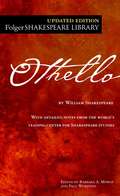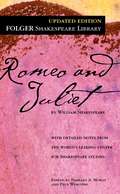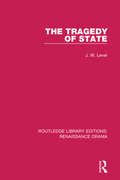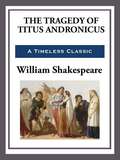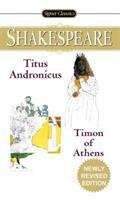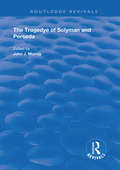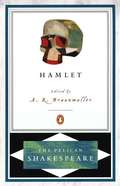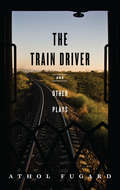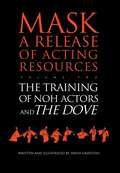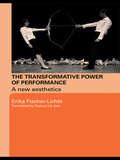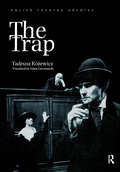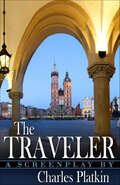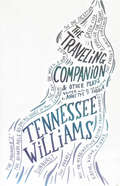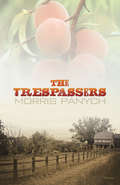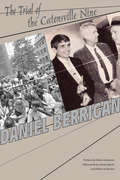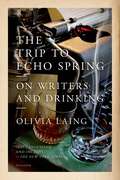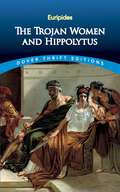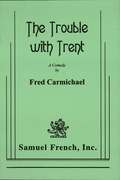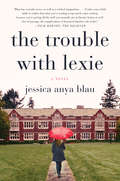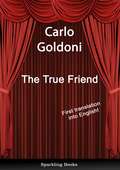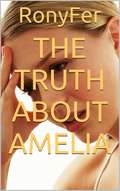- Table View
- List View
The Tragedy of Othello: The Moor of Venice (The Folger Shakespeare Library)
by William Shakespeare Barbara A. Mowat Paul WerstineIn addition to exhibitions open to the public throughout the year, the Folger offers a full calendar of performances and programs. Each edition includes: Freshly edited text based on the best early printed version of the play. Full explanatory notes conveniently placed on pages facing the text of the play. Scene-by-scene plot summaries A key to famous lines and phrases. An introduction to reading Shakespeare's language. An essay by an outstanding scholar providing a modern perspective on the play. Illustrations from the Folger Shakespeare Library's vast holdings of rare books Essay by Susan Snyder The Folger Shakespeare Library in Washington, D. C. , is home to the world's largest collection of Shakespeare's printed works, and a magnet for Shakespeare scholars from around the globe.
The Tragedy of Romeo and Juliet (The Folger Shakespeare Library)
by William Shakespeare Barbara A. Mowat Paul WerstinePresents the original text of Shakespeare's play side by side with a modern version, discusses the author and the theater of his time, and provides quizzes and other study activities.
The Tragedy of State (Routledge Library Editions: Renaissance Drama Ser.)
by J. W. LeverThe domination of the state over the lives of individuals is, arguably, a problem of the present-day world. In this book, first published in 1971, the author finds essentially the same problem in Jacobean tragedy in the shape it assumed during the rise of the first European nation-states. The English dramatists of the early seventeenth century a
The Tragedy of Titus Andronicus
by William ShakespeareTitus Andronicus may be Shakespeare's earliest tragedy; it is believed to have been written sometime between 1584 and the early 1590s. It depicts a Roman general who is engaged in a cycle of revenge with his enemy Tamora, the Queen of the Goths. The play is by far Shakespeare's bloodiest work. It lost popularity during the Victorian era because of its gore, and has only recently begun to revive its fortunes.
The Tragedy of Titus Andronicus: The Life of Timon of Athens
by William ShakespeareAs part of the Signet Classics Shakespeare Series edited by Sylvan Barnet of Tufts University, this edition includes commentaries on both plays as well as up-to-date production histories.
The Tragedye of Solyman and Perseda: Edited from the Original Texts with Introduction and Notes (Routledge Revivals)
by John J. MurrayPublished in 1991 The Tragedye of Solyman and Perseda is a late Elizabethan romantic tragedy by Thomas Kyd, author of The Spanish Tragedy. It dramatises the triangular relationship of the Turkish emperor Soliman, his captive Perseda and her beloved Erastus against the fictionalised backdrop of the Turkish invasion of Rhodes in the early sixteenth century. This volume contains the original text along with textual and critical notes.
The Tragical History of Hamlet Prince of Denmark
by William Shakespeare A. R. BraunmullerHamlet, Prince of Denmark is faced by a ghost bearing a grim message of murder and revenge, driving the prince to the edge of madness by his struggle to understand the situation and to do his duty.
The Train Driver and Other Plays
by Athol Fugard"For me [The Train Driver] is the biggest of them all. Everything I have written before has been a journey to this."-Athol Fugard"A dramatic, moving theater experience written for South Africa. . . . It will save us from hopelessness. See it."-Sunday IndependentThe Train Driver is classic Athol Fugard, and one of his most important plays. The playwright, known throughout the world as a chronicler of his native South Africa's apartheid past, directed its premiere at the newly opened Fugard Theater in one of Cape Town's most politically contentious areas. This seminal work was inspired by the true story of a mother who, with her three children, committed suicide on the train tracks in Cape Town. The two-person drama unfolds between the train's engineer and the grave digger who buries "the ones without names." This edition also includes Coming Home, Fugard's first work addressing AIDS in South Africa, and Have You Seen Us? his first play set in America, about a South African transplanted to San Diego, where the playwright currently resides.Athol Fugard's works includes Blood Knot, Master Harold. . .and the Boys, Boesman and Lena, Sizwe Banzi is Dead and My Children! My Africa! He has been widely produced in South Africa, London, on Broadway, and across the United States.
The Training of Noh Actors and The Dove (Mask - A Release Of Acting Resources Ser. #Vol. 2)
by David GriffithsFirst Published in 1998. Routledge is an imprint of Taylor & Francis, an informa company.
The Transformative Power of Performance: A New Aesthetics
by Erika Fischer-LichteIn this book, Erika Fischer-Lichte traces the emergence of performance as 'an art event' in its own right. In setting performance art on an equal footing with the traditional art object, she heralds a new aesthetics. The peculiar mode of experience that a performance provokes – blurring distinctions between artist and audience, body and mind, art and life – is here framed as the breeding ground for a new way of understanding performing arts, and through them even wider social and cultural processes. With an introduction by Marvin Carlson, this translation of the original Ästhetik des Performativen addresses key issues in performance art, experimental theatre and cultural performances to lay the ground for a new appreciation of the artistic event.
The Trap
by Tadeusz RosewiczFirst Published in 1998. Routledge is an imprint of Taylor & Francis, an informa company.
The Traveler: A Screenplay
by Charles PlatkinCNN travel reporter Seth Thomas is renowned for his rich and detailed articles and guidebooks. But he has an embarrassing secret that could ruin his career. He's never traveled a day in his life. That is, until circumstances lead him to become entangled with the mysterious and sexy Jerico, and he is forced to finally board a plane that will take him to Eastern Europe where an art heist in Poland has just occurred.THE TRAVELER is a four-act screenplay from author Charles Platkin.
The Traveling Companion & Other Plays
by Annette J. Saddik Tennessee WilliamsTwelve previously uncollected experimental shorter plays: The Chalky White Substance * The Day on Which a Man Dies (An Occidental Noh Play) * A Cavalier for Milady * The Pronoun "I" * The Remarkable Rooming House of Mme. LeMonde * Kirche, Küche, Kinder (An Outrage for the Stage) * Green Eyes * The Parade * The One Exception * Sunburst * Will Mr. Merriwether Return from Memphis? * The Traveling Companion Even with his great commercial success, Tennessee Williams always considered himself an experimental playwright. In the last 25 years of his life his explorations increased--especially in shorter forms and one-act plays--as Williams created performance pieces with elements of theater of the absurd, theater of cruelty, theater of the ridiculous, as well as motifs from Japanese forms such as Noh and Kabuki, high camp and satire, and with innovative visual and verbal styles that were entirely his own. Influenced by Beckett, Genet, and Pinter, among others, Williams worked hard to expand the boundaries of the lyric realism he was best known for. These plays were explicitly intended to be performed off-off Broadway or regionally. Sometimes disturbing, sometimes outrageous, quite often the tone of these plays is rough, bawdy or even cartoonish. While a number of these plays employ what could be termed bizarre "happy endings," others gaze unblinkingly into the darkness. Though several of Williams' lesser-known works from this period have already been published by New Directions, these twelve plays have never been collected. Most of these shorter plays are unknown to audiences and scholars--some are published here for the first time--yet all of them embrace, in one way or another, what Time magazine called "the four major concerns that have spurred Williams' dramatic imagination: loneliness, love, the violated heart and the valiancy of survival."
The Trespassers
by Morris PanychLowell is no average teenager-and his grandfather, Hardy, is no conventional role model. Hardy may once have owned the abandoned orchard at the heart of town where they spend time trespassing and discussing ethics as if it were nothing more than a game. When inspector Milton shows up to investigate a murder, Lowell's truths are put to the ultimate test.
The Trial of the Catonsville Nine
by Daniel BerriganOn May 17, 1968, at the height of the Vietnam War, nine men and women entered a Selective Service office outside Baltimore. They removed military draft records, took them outside, and set them afire with napalm. The Catholic activists involved in this protest against the war included Daniel and Philip Berrigan; all were found guilty of destroying government property and sentenced to three years in jail. Dan Berrigan fled but later turned himself in.The Trial of the Catonsville Nine became a powerful expression of the conflicts between conscience and conduct, power and justice, law and morality. Drawing on court transcripts, Berrigan wrote a dramatic accountof the trial and the issues it so vividly embodied. The result is a landmark work of art that has been performed frequently over the past thirty-five years, both as a piece of theater and a motion picture.
The Trident Tragedy
by Robert J. Szilagye Stanley MonroeAMERICA'S MOST AWESOME NUCLEAR WEAPON-IT RETURNED FROM ITS MAIDEN VOYAGE AS FLAWLESS AS IT HAD LEFT-WITH EVERY MAN ABOARD DEAD.... A HANDPICKED CREW One hundred sixty-one men-proud officers and crew-on the test voyage of a submarine unlike any other in the world. They knew their ship. They knew their duty. But they never suspected their fate. A MYSTERIOUS DISASTER What had happened aboard the U.S.S. Trident? Why had it been found with every man lying dead at his station? Was it a freak accident? Criminal negligence? Or was it sabotage? TWO RELENTLESS INVESTIGATORS One was a female reporter who hated the Navy. The other was a Naval Intelligence officer who mistrusted the press. Separately, they were getting nowhere. Together, they were uncovering just enough to get themselves killed. And should they perish, who would be left to uncover the stunning truth behind ....
The Trip to Echo Spring: On Writers and Drinking
by Olivia LaingIn this book, the author takes a journey across America, examining the links between creativity and alcohol in the work and lives of six extraordinary men: F. Scott Fitzgerald, Ernest Hemingway, Tennessee Williams, John Berryman, John Cheever, and Raymond Carver. Captivating and highly original, this book strips away the myth of the alcoholic writer to reveal the terrible price creativity can exert.
The Trojan Women and Hippolytus (Dover Thrift Editions)
by EuripidesThese two powerful classics of ancient drama are excellent examples of the author's gift for adapting traditional material for decidedly nontraditional effect. Through them Euripides critically examines social and moral aspects of contemporary life and even specific political events. He endows his figures with shrewdly observed individual character, implicitly deflating the emblematic simplicity of traditional narratives and making him seem the most modern of the great Greek dramatists.The Trojan Women, one of the most powerful indictments of war and the arrogance of power ever written, is played out before the ruined walls of Troy. A grim recounting of the murder of the innocent, the desecration of shrines, and the enslavement of the women of the defeated city, it reveals the futility of a war fought for essentially frivolous reasons, in which the traditional heroes are shown to be little better than bloodthirsty thugs. Hippolytus is primarily about the dangers of passion and immoderation, whether in pursuing or in thwarting normal desires — struggles symbolized by the gods, who embody natural forces and behave like irresponsible humans.Required study for any college course in literature and mythology, these two masterpieces are essential reading for anyone interested in the roots of world drama.
The Trouble With Trent
by Fred CarmichaelComedy / 2m, 6f / Interior / Sparkling dialogue, fascinating characters, satirical insights and laughs galore abound in this tale of mistaken identities that begins with three mystery buffs E mailed chapters to each other and met for two weeks to polish off their first book. The publication enjoys mild success until their literary agent hints that Sarah Trent, the pen name they adopted, is a real person. Book sales soar. Meanwhile a Washington socialite being blackmailed over a possibly illicit weekend intends to send Sarah a story she has written about herself. She mistakenly sends the manuscript to the blackmailer and the money to the beach cottage where the three ladies behind the name Trent are gathered to complete another book. Nailing the blackmailer and keeping Sarah's identity a secret during the resulting confusion is first rate comedy by a popular author of the genre.
The Trouble with Lexie: A Novel
by Jessica Anya Blau“There isn’t a human alive who can resist the charm of Jessica Anya Blau’s novels! A coming-of-age tale for the new millennium, The Trouble with Lexie is one of the most deeply enjoyable—and deeply satisfying—novels I’ve read in ages.” —Joanna Rakoff, author of My Salinger YearFrom the beloved author of The Summer of Naked Swim Parties and The Wonder Bread Summer comes the jaw-dropping story of Lexie James, a counselor at an exclusive New England prep school, whose search for happiness lands her in unexpectedly wild trouble.Lexie James escaped: after being abandoned by her alcoholic father, and kicked out of the apartment to make room for her mother’s boyfriend, Lexie made it on her own. She earned a Masters degree, conquered terrifying panic attacks, got engaged to the nicest guy she’d ever met, and landed a counseling job at the prestigious Ruxton Academy, a prep school for the moneyed children of the elite.But as her wedding date nears, Lexie has doubts. Yes, she’s created the stable life she craved as a child, but is stability really what she wants? In her moment of indecision, Lexie strikes up a friendship with a Ruxton alumnus, the father of her favorite student. It’s a relationship that blows open Lexie’s carefully constructed life, and then dunks her into shocking situations with headline-worthy trouble.The perfect cocktail of naughtiness, heart, adventure and humor, The Trouble with Lexie is a wild and poignant story of the choices we make to outrun our childhoods—and the choices we have to make to outrun our entangled adult lives.
The Trouble with Northrup; A Trampoline’s Highs and Lows; Jimmy Aaron’s Best Worst Day of Fifth Grade
by Kevin Kelly Jeffrey B. Fuerst Anthony CarpenterNorthrup has stopped talking and no one knows why. His family is frantic. Will Dr. Kloppennoggin get him to speak again? Here comes Cannonball Jones, about to make Trampoline's life miserable. Is there any joy in being a kid's favorite toy? Jimmy has to dance with a girl-one seven inches taller than he. Will this be Jimmy's worst-or best-day of fifth grade? Read these plays to find out.
The True Friend: English translation of Il vero amico
by Carlo GoldoniTrue to Goldoni's mixture of comic wit and farce, the plot is a breathtakingly fast succession of twists and turns which only unravel in the final lines with a surprise ending.Two friends are in love with the same young woman. Neither wants to place their friendship in jeopardy. How can love triumph without breaking off their friendship? Goldoni explores the conflicts brought about when Florindo has to choose between Lelio, his best friend, and Rosaura, his friend's fiancée. Added to this conundrum are the issues of whether Ottavio, the old miser, will provide a dowry and the mature Beatrice's unashamed incessant pursuit of Florindo.The play is set in Bologna in Lelio's house. Florindo is a guest along with his faithful manservant. From the opening of the play, Florindo seeks to return home to Venice in order not to damage his friend's relationship. However, his departure is obstructed by his hosts, leading to one complication after another.From the beginning, the plot is intense and fast-moving with inversions fed into the action in quick succession. This creates suspense which continues throughout the play as potential marriage partners are switched back and forth until the very ending when the audience finally discovers what the main characters' destiny will be. Will love or friendship prevail?The Venetian element is brought into this play through Florindo and his manservant, both Venetians. Apart from these two characters, all the others are portrayed as self-seeking, selfish and sly - whether servants or masters. The tension is kept at a constantly high level by the struggles between the characters. These struggles are not just brought about through love and friendship but are also generational and social. Furthermore, there is the added complication in the contrast of the characters' ideas of reality as they deceive one another. This creates dramatic irony and humour as the audience know more than any of the characters on stage.
The Truth About Amelia
by Toscana Navas Mouton Rony Fernando GonzalezShe ran out of tears from the long mourning, retaining all of the pain inside of her, that same pain that oppressed her heart. Her swollen feet were bleeding after spending hours walking aimlessly. All of the tragedies that she experienced were revealed in a moment that lasted an eternity. In those moments, alone, vulnerable, and defeated, she watched the immense riverbed from the top of that bridge, watching it disappear between the soft hollows through the horizon. At that early summer morning, the forces of destiny brought her to that place. All that remained was to decide. The questions about how and why the suffered events occurred were not important anymore, they were gone. She watched the moon with that silver color, reflecting light in the calm waters; at the same time that she kissed the scapulary of the Chiquinquira's virgin that was hanging on her chest. After the recent events, lost in the nothingness, and without having any other alternative; she could end up thinking about end up for once with her own life. Nobody would care what she could do at that time. She was alone, deeply alone and helpless. Her last thoughts were about her apartment, the bed, and the body of her dead mother.
